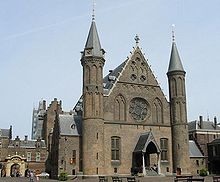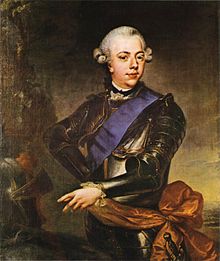- Prinsjesdag
-
The Golden Carriage on Prinsjesdag

Prinsjesdag (English: Prince's Day) is the day on which the reigning monarch of the Netherlands (currently Queen Beatrix) addresses a joint session of the Dutch Senate and House of Representatives in the Ridderzaal or Hall of Knights in The Hague. The Speech from the Throne (Dutch: Troonrede) sets out the main features of government policy for the coming parliamentary session. The occasion is prescribed by the constitution, article 65 of which states:
A statement of the policy to be pursued by the Government shall be given by or on behalf of the King before a joint session of the two Houses of the States-General that shall be held every year on the third Tuesday in September or on such earlier date as may be prescribed by Act of Parliament.
Contents
Speech from the Throne
The first part of Prinsjesdag is the Speech from the Throne at the assembly of the States-General in the Ridderzaal.
At around 12:30 on Prinsjesdag, the members of the Senate and House of Representatives enter the Ridderzaal.
They sit opposite and to the left and right of the throne. The ministers and state secretaries sit to the left of the throne. Behind them sit members of the Council of State, the government’s highest advisory body. They all sit in the enceinte, an area enclosed by unobtrusive wooden barriers symbolising that the head of state is in conference with Parliament.
Outside the enceinte are seats for the other High Councils of State, senior civil servants, high-ranking officers of the armed forces, senior members of the judiciary, the Queen’s Commissioner of the province of South Holland, the mayor of The Hague and specially invited guests.
At the stroke of one, the Queen, normally accompanied by other members of the Royal House, leaves Noordeinde Palace in the Golden Carriage for the Binnenhof, escorted by court dignitaries and a military escort of honour. Outside the palace stand an escort of honour and a military band.
As the Queen arrives at the Binnenhof, a band by the steps strikes up the Wilhelmus (national anthem). The Queen and other members of the Royal House salute the colour of the Royal Netherlands Marines Corps (the most ancient regiment in the Dutch armed forces) and mount the Ridderzaal’s steps, above which hangs a canopy.
The president of the Senate presides over the joint session. Shortly before 13:00, he opens the meeting and then appoints a number of ushers from among the members of the two Houses to escort the Queen and her entourage. On this occasion, male MPs wear their most formal dress, while female MPs try to outdo each other with extravagant hats.
The ushers receive the Queen and the members of the Royal House at the entrance to the Ridderzaal. The president of the joint session then announces the arrival of the head of state: a signal for all those present to stand. The Queen then proceeds to the throne, from where she delivers her Speech from the Throne. In her capacity of (formal) head of the Government she announces the plans for the new parliamentary year. The Queen's Speech is not written by the Queen, but by the Prime Minister and the cabinet.
When the Speech is finished, the speaker of the Senate proclaims "Lang leve de koningin!" ("Long live the Queen!") which is answered by everyone present with "Hoera! Hoera! Hoera!" This brings an end to the joint session of the two houses. The ushers escort the Queen and members of the Royal House to the door. The president then closes the session.
When the Queen leaves the Ridderzaal, the escort of honour again forms in the Binnenhof, and the procession returns to Noordeinde Palace where she traditionally salutes the gathered crowd from the balcony.
Proposal of the next year's budget
After lunch, the Minister of Finance proposes the next year's national budget and the Budget Memorandum (the Miljoenennota) to the House of Representatives. The budget submitted is carried in a special case which has printed on it in Dutch: "Third Tuesday of September", but due to the size of the case, it probably contains only a part of the entire memorandum.
The presentation is followed by a cycle of parliamentary debates on the budget. These are called the algemene beschouwingen (general deliberations). It is the most important moment for parliamentary policy making, as MPs can amend the budget to finance specific plans.
History
In the 18th century, Prinsjesdag was one of the country's most popular public holidays and was originally used to celebrate the 8 March birthday of Prince William V.
Between 1780 and 1797 — known as the Patriot era, leading up to the Batavian revolution — the day was used for demonstrations of loyalty to the House of Orange, which is probably why the current name was chosen in the 19th century for the ceremonial opening of parliament.
Historically, the constitution has stated that the opening of parliament should take place on a fixed date. The opening of parliament was originally held on the first Monday in November in the first half of the 19th century and then the third Monday in October, but when a constitutional revision introduced annual budgets in 1848, more time was needed to debate the budget, so the date was brought forward a month. Monday was considered inappropriate, because many parliamentarians in distant parts of the country needed to leave their homes on Sunday to make it to The Hague in time, so a 1887 revision moved Prinsjesdag to Tuesday.
Throughout the years 1815 to 1904, the speech from the throne was given in the assembly room of the House of Representatives, but was moved back to the Hall of Knights after an extensive restoration of the building at the start of the 20th century.
The pomp and circumstance is still very much part of the day.
2010 incident
On Prinsjesdag 2010 a mentally disturbed man threw a tea light holder against the Golden Coach (which suffered minor scratches to the paintwork). The man was swiftly detained and is currently (after more than 6 months) still being held on charges of assaulting the Queen.[1]
References
- ^ (Dutch) Article in De Telegraaf newspaper
External links
Categories:- Dutch political institutions
- Heads of state speeches
- Dutch words and phrases
Wikimedia Foundation. 2010.




